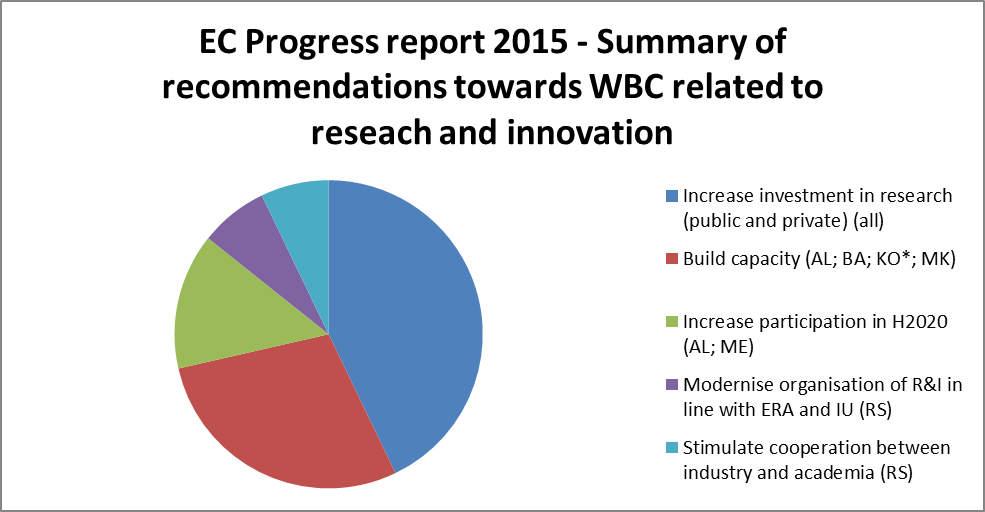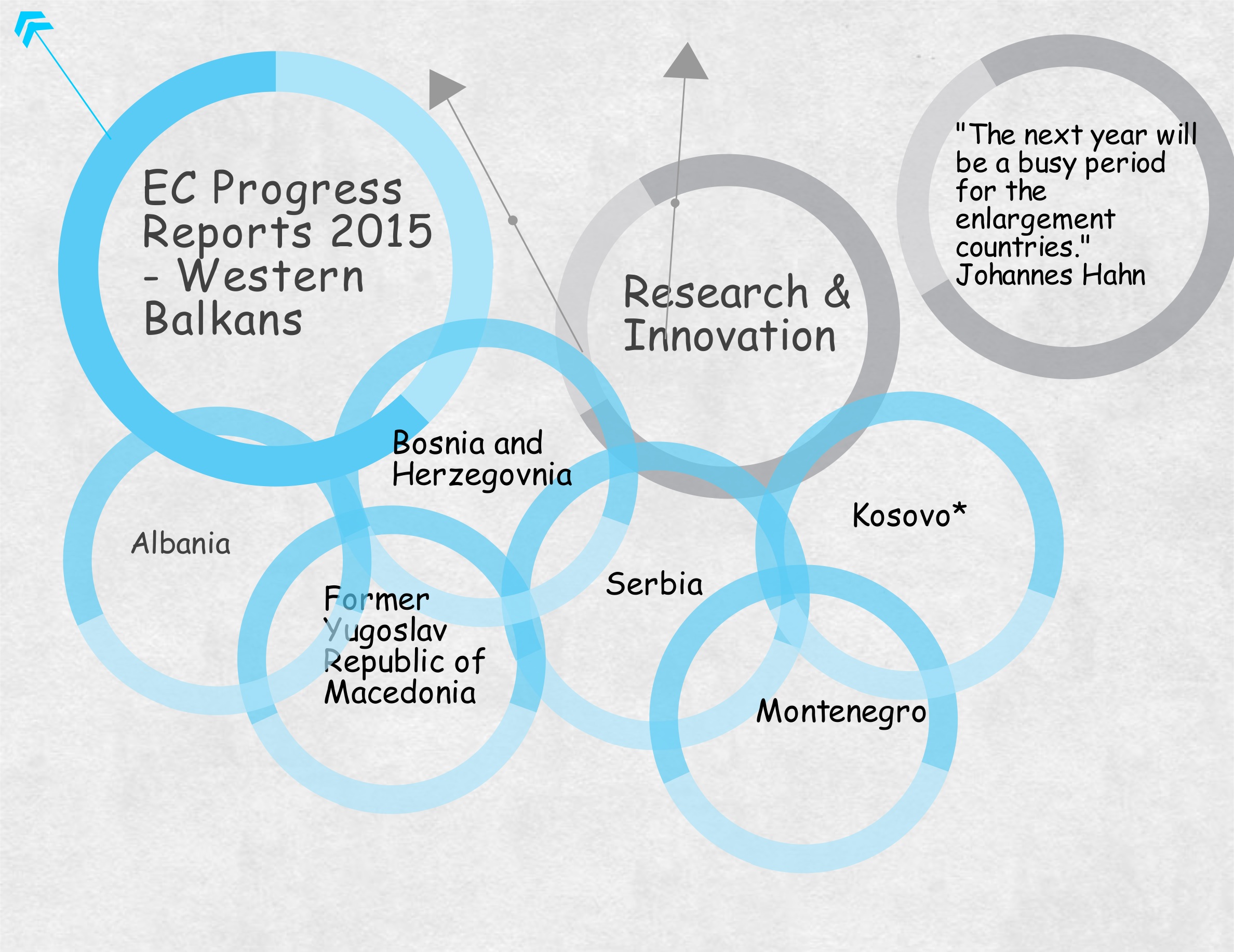News archive - EC Progress reports WBC 2015 - progress made in Science, Research and Education
Each year the Commission adopts its "Enlargement package" - a set of documents explaining its policy on EU enlargement and reporting on progress achieved in each country. Most importantly, this package includes the annual Enlargement Strategy Paper which sets out the way forward for the coming year and takes stock of the progress made over the last twelve months by each candidate country and potential candidate. In addition to this strategy paper, the package contains the so-called Progress Reports in which the Commission services present their assessment of what each candidate and potential candidate has achieved over the last year.
Below excerpt on progress made in Science, Research and Education for each WB country is provided as well as recommendations for 2016.
 |
Albania
Preparations are at an early stage in the area of science and research. There was no progress in the past year.
In the coming year, the country should in particular:
→ build capacity and increase investment in research to ensure integration into the European Research Area and contribute to the Innovation Union;
→ increase efforts for successful participation in the research and innovation framework programme Horizon 2020.
Overall, actions in line with EU policy on research and innovation have not been implemented due to lack of national funding. As regards framework programmes, Albania is associated to the EU research and innovation programme 'Horizon 2020' (2014-2020) and all administrative actions for participation are in place (national contact points and representatives in Horizon 2020 programme committees have been appointed). Based on first Horizon 2020 statistics, the number of Albanian participants in proposals selected for funding has been very small. The Agency for Research, Technology and Innovation still lacks the resources to promote cooperation on research and innovation. Albania should take actions to improve the scientific excellence and participation of the private sector in research and innovation should be stimulated. Albania has been active in cooperating at regional level following its co-signing of the Western Balkan regional R&D strategy for innovation and it cooperates with the Central European Initiative.
On integration into the European Research Area, Albania has appointed a member in the European Research Area Committee, however, is not participating in it on a regular basis. The level of investment in research stagnated at about 0.4 % of Albania’s GDP. This is insufficient to make a meaningful contribution to competitiveness and growth. Due to a lack of reliable statistics it is also difficult to measure the precise level, in particular for expenditure on research by the private sector.
On the Innovation Union, no specific actions to stimulate innovation have been taken.
Bosnia and Herzegovina
Preparations on education and research and innovation policy are at an early stage. There was no progress in these sectors but Bosnia and Herzegovina actively participated in different cultural programmes as well as research networks and activities.
In the coming year, the country should in particular:
→ step up coordination and harmonisation of the legal framework on education;
→ strengthen the capacity of State-level education agencies to develop EU standards, including for quality assurance in education;
→ step up efforts to strengthen the research and innovation capacity.
On research and innovation policy, following Bosnia and Herzegovina's association to the EU's 'Horizon 2020' programme, a Network of National Contact Points (NCPs) was established and representatives in the Horizon 2020 Programme Committees were nominated.
Bosnia and Herzegovina also organised several workshops and information days on Horizon 2020 but based on initial statistics, successful participation is limited. Further efforts are needed to increase the country's participation in particular on research and innovation actions on societal challenges and on participation of SMEs as well as on scientific excellence in general.
Bosnia and Herzegovina continues to show good participation in COST, the framework supporting trans-national cooperation among researchers, engineers and scholars across Europe, but the country's participation in Eureka is less successful. Bosnia and Herzegovina cooperates at regional level as co-signatory of the Regional Strategy on Research for Innovation, with the Central European Initiative (CEI) and with UNESCO.
At policy level, some progress was made on human capital building as more universities and institutes signed the European Charter for Researchers and a Code of Conduct for the Recruitment of Researchers. Bosnia and Herzegovina participates regularly in the European Research Area Committee (ERAC) and related advisory bodies and in regional networks and initiatives. According to statistical data from Bosnia and Herzegovina, the total expenditure on research (both public and private investment) amounted to less than 69.6 EUR million or 0.27% of its GDP in 2012.
Kosovo*
Preparations in education and research are at an early stage. There has been no progress in this area over the last year. The quality of education needs to be considerably improved.
In the coming year, Kosovo should in particular:
→ improve quality of education at all levels and improve access to quality education for marginalised groups, especially children with disabilities, Roma, Ashkali and Egyptian children;
→ ensure the autonomy and independent operation of higher education institutions and adopt a new law for higher education based on international standards;
→ strengthen research and innovation capacity through reform of higher education institutions and increase investment in research, both in the public and private sectors.
Kosovo has taken limited action to develop its research and innovation capacity. The capacity of universities in Kosovo to undertake research work is extremely limited, which negatively affects the quality of post-graduate programmes and innovation. The budget for research remains insufficient as the level of investment in research is still below 0.2 % of GDP. The law on scientific research activities is not being implemented due to a lack of funding. The link between research and business remains weak. Kosovo participates in the EU research and innovation programme 'Horizon 2020' but the number of projects evaluated successfully and receiving funding is very small.
 |
Former Yugoslav Republic of Macedonia
There is a good level of preparation in the area of science and research. Good progress was made with respect to actions on innovation, and with initial and active participation in the EU Research and Innovation Programme "Horizon 2020".
In the coming year, the country should focus on:
→ actions to strengthen the research capacity in line with the European Research Area;
→ increasing the level investment in research in particular by the private sector.
A network of national contact points was established and representatives in the Horizon 2020 Programme Committees, have been nominated. Several workshops and information days on Horizon 2020 have been organised which resulted in a large number of applicants submitting proposals for funding. Based on first Horizon 2020 statistics, about 20 projects were successfully evaluated. An Action Plan on promotion and support for participation in Horizon 2020 was adopted focussing on SMEs and mobility of scientists. The country cooperates actively at regional level on the implementation of the Regional Strategy on Research for Innovation and with the Central European Initiative (CEI) and UNESCO.
As regards policy actions on research and innovation, the country concentrated on innovation. Implementation of the National Innovation Strategy is high on the political agenda, as demonstrated by the allocation of EUR 20 million (in part with a World Bank loan) through the Fund for Innovation and Technological development to facilitate access to risk capital to co-finance innovations, new technologies start-ups and spinoff companies. As regards strengthening research capacity, a new 2015-2019 programme for higher education and scientific and research activities is being prepared, aiming at funding national research in line with the EU priority areas. The level of investment in research stagnated at less than 0.30%. The country nominated representatives to the European Research Area Committee and related advisory bodies but due to lack of administrative capacity participation was limited.
Montenegro
There is a good level of preparation in this chapter and some progress was made in the past year.
In the coming year, Montenegro should in particular:
→ enhance efforts to increase investment in research, in particular through stimulating investment by the private sector;
→ increase and focus efforts on participation in the EU Programme 'Horizon 2020'.
Montenegro participates in the EU Research and Innovation programme 'Horizon 2020' (H2020) as an associated country. Administrative capacity for H2020 is good, with a nominated network of National Contact Points (NCPs) and representatives in the H2020 Programme Committees. Workshops and information days were organised, and regular "Open Door Days" on specific H2020 topics were held, aimed at increasing participation by bringing together relevant stakeholders. However, based on the first H2020 Statistics, successful participation is very low. Montenegro should assess its current H2020 performance; increase and focus efforts on areas of strategic interest to the country; and stimulate further participation of SMEs in these actions. Participation in EUREKA is also limited. In May, Montenegro became a full member of COST. Montenegro signed the new 2014-2020 Framework Programme for Cooperation with the International Atomic Energy Agency in October. Montenegro cooperates at regional level as co-signatory of the Regional Strategy on Research for Innovation, with the Central European Initiative, and UNESCO. In December, parliament adopted amendments to the law on scientific research activities.
Regarding integration into the European Research Area (ERA), Montenegro nominated an observer delegate and regularly attends meetings with the European Research and Innovation Committee; but participation in other related ERA advisory bodies should also be considered.
Serbia
Serbia is at good level of preparation in science and research. Some progress was made in improving the framework for science, research and innovation.
In the coming year, Serbia should in particular:
→ take actions to modernise organisation of research and innovation in line with the European Research Area and Innovation Union;
→ stimulate cooperation between industry and academia and increase level of investment in research.
Serbia participates in EU research and innovation programmes Horizon 2020. It has taken measures to ensure good administrative capacity notably established a good network of National Contact Points (NCPs), nominated representatives in the Horizon 2020 Programme Committees and organised at regular intervals workshops and information days on Horizon2020. Based on first Horizon 2020 statistics, participation is good. Serbia obtained for the first time a grant from the European Research Council (ERC) which demonstrates scientific excellence. Further efforts remain necessary in particular to increase participate in research and innovation actions on societal challenges and involve private sector in research.
On the European Research Area, limited policy actions have been taken in the last year. In 2014, the level of investment in research decreased to 0.78% of GDP compared to almost 1 % in 2013. The level is now substantially lower than Serbia's own national target. Serbia nominated its representative in the European Research Area Committee (ERAC) and related ERA advisory bodies and attends regularly the meetings.
On measures for the Innovation Union, the Serbian Innovation Fund continues to be active, and has successfully implemented 55 projects.
- Western Balkans
- Cross-thematic/Interdisciplinary
Entry created by Ines Marinkovic on November 11, 2015
Modified on November 11, 2015


